The resignation of Boris Johnson has opened up a new chapter in the crisis of British capitalism. The working class is reawakening. A new generation is moving into struggle. We must build the forces of Marxism to prepare for these titanic events.
The world situation, the background to understanding the processes in Britain, is increasingly turbulent, as the global economy slides into another recession.
The whole position has been aggravated by the war in the Ukraine, which is having far reaching consequences by pushing up the price of oil and gas. The serious strategists of capitalism are alarmed at this impasse.
“This new epoch of the world is creating huge challenges,” warned Martin Wolf in the Financial Times (28 June 2022). “It is possible – perhaps even probable – that the world system will shatter.”
This means intensified upheaval internationally; clashes and struggle between the classes on a titanic scale – as exemplified by events in Ecuador and Sri Lanka. Revolutionary convulsions are everywhere on the order of the day.
Foresight over astonishment
Britain, once the most stable country in Europe, has become possibly the most unstable. The UK situation has become increasingly convulsive – politically, economically, and socially.
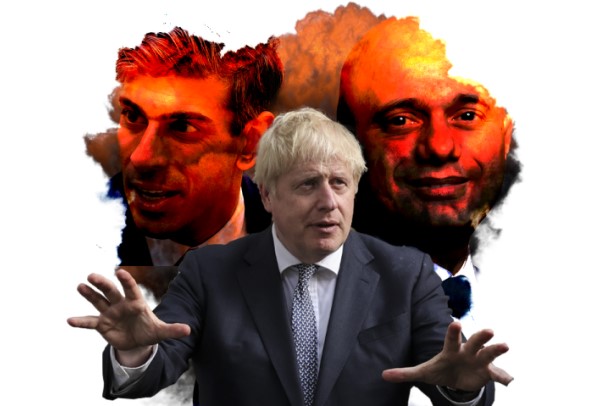 The Marxist theory offers the advantage of foresight over astonishment / Image: Socialist Appeal
The Marxist theory offers the advantage of foresight over astonishment / Image: Socialist Appeal
The demise of the Boris Johnson government was simply a part of this fact; a reflection of the deepening crisis of British capitalism.
It should be noted that the present crisis was predicted by our tendency more than two-and-a-half years ago.
In January 2020, a month after Johnson’s historic victory in the general election, which yielded the biggest Tory majority in four decades, we wrote in our organisation’s British Perspectives document, that:
“The election of a new Boris Johnson Tory government with a sizable majority represents the beginning of another turbulent stage in Britain.”
Johnson, we said, would “soon reveal himself as the head of a government of crisis. Such will be the turmoil, Johnson will wish he had never won the election.”
“Johnson will become the most hated Tory politician in modern times…
“How long this Tory government will last is not possible to say in advance. It will be crisis-ridden and besieged on all sides. Given the crisis facing it, it is possible it will not last its full term. Eventually, Boris could get his wish and ‘die in a ditch’ along with the government…
“His government will be the most unpopular in recent history.”
At the same time, bourgeois commentators were talking of a decade or more of Tory rule. Only our tendency – the Marxist tendency – was able to foresee these developments.
This demonstrates the absolute correctness of our method, based on Marxist theory, which offers – in the words of Leon Trotsky – “the advantage of foresight over astonishment”.
Paralysis and instability
This prediction was based upon the intractable chasm opening up in British society, which was seemingly disguised by the 2019 election result.
In fact, the Johnson government became the most inept government in British history, run by the most shortsighted and stupid representatives of the ruling class.
Boris came to personify this dysfunctional state of affairs. In turn, the egotistical, reckless former PM helped to intensify the crisis of British capitalism at every level. Rather than providing stability, Johnson’s actions only created greater instability.
To the bitter end, as everything crashed around him, he defiantly held on. This bunker mentality provoked further anguish amongst the ruling class and within the Tory Party.
Even now, he has unilaterally decided to remain as a caretaker prime minister, until a new Tory leader is chosen. “He has to accept that he is in office not in power,” stated Sir Bernard Jenkin, a senior Conservative, however, trying to hold the line.
This parliamentary paralysis in Britain is without precedent.
Turned to dust
Not so long ago, Johnson was bragging that he was looking forward to a third term. That quickly turned to dust.
 Whoever the Tories end up with as leader will not make a fundamental difference / Image: Socialist Appeal
Whoever the Tories end up with as leader will not make a fundamental difference / Image: Socialist Appeal
Once again, this serves to underline the point that we are in a period of sharp turns and sudden changes in the situation. Dialectically, things are turning into their opposite.
In reality, this extreme volatility in British society is a clear indication of the beginning of a pre-revolutionary situation. This will not be short-lived, however, but will be protracted, extending over a number of years.
Boris’ departure has done nothing to improve matters for the ruling class. Rather, his exit from Downing Street has now opened up a civil war within the Tory Party over his successor.
While the bourgeois are attempting to get a grip on the situation, the situation is pregnant with uncertainty. It was precisely the blindness and obtuseness of the British bourgeois that led them into this situation in the first place. They had lost control over the situation, including over their so-called political representatives.
The Tories are in the process of choosing a new leader as we go to press. The current procedure is for the parliamentary Conservative party to agree on two names. These will then be given over to the Tory ranks to pick between.
Given their extremely reactionary, ultra-Brexit views, well to the right of even Tory MPs, Conservative members are likely to choose the worst candidate from the point of view of British capitalism. This, after all, is how Johnson ended up as leader.
The ruling class could therefore easily end up in a deeper mess than before. That is why there have been calls for rules to be bent, in order to simply allow Tory MPs to make the final decision.
If Starmer could destroy democracy in the Labour Party, why couldn’t they do the same in the Tory Party? But it seems they have left it too late.
Whoever they end up with as leader will not make a fundamental difference, however. Politically, Johnson has managed to single-handedly shatter the fortunes of the Tory Party. Most commentators have written off any chance of success for the Conservatives at the next election, especially with the unfolding crisis.
Perfect storm
The task of Marxism must be to look beyond the surface of events; to examine the general processes, and understand their ramifications.
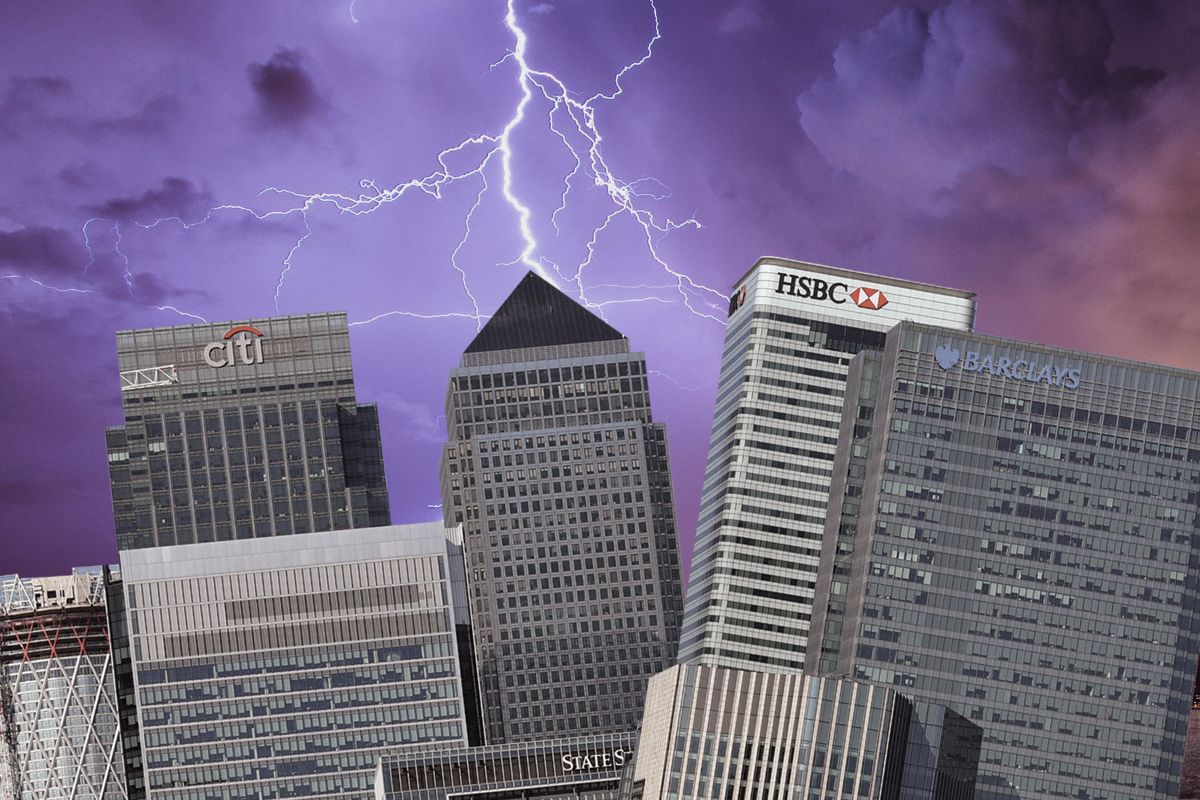 The present crisis is quite unprecedented, described by many as a perfect storm / Image: Socialist Appeal
The present crisis is quite unprecedented, described by many as a perfect storm / Image: Socialist Appeal
The current situation is quite unprecedented. The present crisis is possibly the most serious in British history, described by many as a perfect storm.
The turmoil at the top coincides with the greatest squeeze on living standards for forty years. This, in turn, has provoked the reawakening of the working class in Britain, which is of key importance.
The consequences of the deep slump of 2008 took several years to work through. Then there followed a series of political earthquakes: the rise of the Scottish independence movement and the collapse of the Labour Party north of the border; the election of Jeremy Corbyn as Labour leader, and the subsequent influx of hundreds of thousands of new members into the party; the Brexit referendum result, followed by the debacle of the Johnson government.
Then there was the economic collapse of 2020, triggered by the pandemic, which produced the greatest fall in UK GDP in over 300 years.
The recovery from the coronavirus crisis did not last long. Unprecedented levels of government stimulus and cheap money, coupled with supply-chain dislocations and bottlenecks, sowed the seeds for soaring inflation.
Inflation has now risen to levels not seen for forty years. Rubbing salt in the wound, rising prices are taking place alongside a new economic downturn. British capitalism – the sick man of Europe – is being hit especially hard.
The UK economy is in a parlous state and is sinking fast. For all intents and purposes, the economy has ground to a halt. And the worst is yet to come.
The OECD predicts that – next year – Britain will be the worst performing economy in the G20 countries, apart from Russia. There will be no growth, as economic activity flatlines.
The Office of Budgetary Responsibility recently concluded that new risks “add up to a challenging outlook for this and future governments as they steer the public finances through inevitable future shocks, while managing multiple slow-building pressures”.
What they mean is that the government’s massive accumulated debts are unsustainable and must be eliminated. This means massive cuts to public spending, and attacks on wages as have never been seen before.
That was the real meaning of the clash between Boris Johnson and Rishi Sunak. The former chancellor wanted to rebalance the books, but Johnson was resisting, knowing how unpopular further cuts would be.
On a capitalist basis, however, there is no other course but savage retrenchment against the standards of living of the working class.
Class war
What we are seeing is not simply a governmental crisis, but a crisis of the whole regime. The mass of people hold the entire capitalist establishment in contempt.
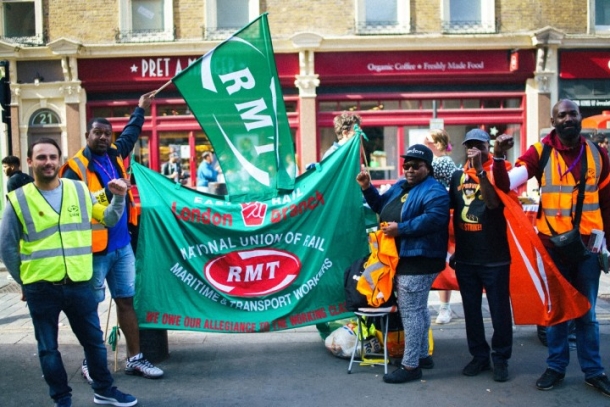 In just one week recently, 40,000 rail workers went on strike / Image: Socialist Appeal
In just one week recently, 40,000 rail workers went on strike / Image: Socialist Appeal
The cost-of-living crisis, which has only just begun, has added a deadly twist to the situation. All classes are being shaken from top to bottom. The level of uncertainty has never been as great.
Added to this is the awakening of the working class in Britain, after decades of passivity. Responsibility for this acquiescence lies with the trade union leaders, who sowed despondency throughout the working class, acting as a wet blanket on any potential struggle.
Such was the ebb on the industrial plane that the total number of workers who went on strike in 2017 was a mere 30,000 throughout the whole year – the lowest on record.
How things have changed! Today, there has been a burst of strikes and ballots for action, as inflation begins to bite.
In just one week recently, 40,000 rail workers went on strike – the first national action on the railways in thirty years.
Alongside rail workers, we have seen moves towards industrial action by bus workers, refuse workers, airport workers, construction workers, and postal workers. Civil servants, teachers, lecturers, and even barristers are on the move.
Telecom workers have voted 96% in favour of strike action. London bus workers voted by 99% to strike. Unite the Union alone are involved in around 100 disputes.
Many workers cannot afford not to strike, as living costs spiral. New layers of workers, who have never taken strike action before, will be drawn into the struggle.
As a result, consciousness is being transformed. There will be leaps in consciousness, especially amongst the fresh layers and the youth. Many will be hardened in the struggle, and will become politicised.
This represents a turning point in the class struggle. Even the Sun newspaper, the Murdoch rag, had a front page declaring ‘CLASS WAR’.
Walking on a tightrope
Appetite comes with eating, as they say. Strikes will encourage more strikes, which can become generalised. Confidence will be rebuilt within the working class. The trade union leaders – left and right – will be under enormous pressure to act.
Another feature of the situation is the high public support for the strikers. According to one poll, 70% of Britons support the right of rail workers to take strike action.
Such is the alarm in ruling circles, one cabinet minister recently warned that the government was walking a “delicate tightrope” in terms of attempts to keep pay down without provoking multiple sectors to go out on strike.
“If we get this wrong, we risk going into a de facto general strike that will create further turmoil that risks grinding the whole economy to a halt,” this Tory MP stated.
This potential for a general strike is inherent in the situation. In their own words, the ruling class is walking on a “tightrope”, and they could stumble into a general strike.
Government attempts to use agency workers – scab labour – will only add fuel to the fire. Even the companies who supply agency workers have warned against such steps.
Mole of revolution
We have to understand that we are facing a social explosion in Britain, as all the contradictions come to the fore. The “old mole of revolution”, to quote Marx, is burrowing away underneath the already disturbed surface of events.
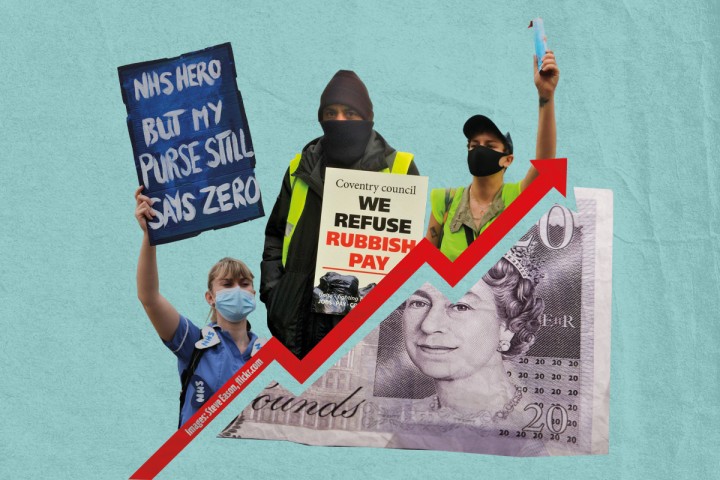 The dramatic rise in prices is a recipe for a massive upturn in the class struggle / Image: Socialist Appeal
The dramatic rise in prices is a recipe for a massive upturn in the class struggle / Image: Socialist Appeal
The dramatic rise in prices is a recipe for a massive upturn in the class struggle. Section after section of workers are being forced to enter the fray. Train drivers and ticket staff have now been balloted to join the rest of rail workers in taking action.
Added to this scenario are the protests that have blockaded roads and motorways over the increasing cost of fuel, which one newspaper compared to the beginning of the ‘yellow vests’ movement in France.
This anger and bitterness is also spreading into the middle class, especially to the owners of small businesses affected by these massive costs. Many will be on the edge of bankruptcy.
One sector after another is facing such dire problems. Millions of workers, pushed into self-employment, are facing increasing hardship.
The ruling class understands the dangers they face, but they seem impotent to do anything about them. They may have concluded that the Tories are a liability, and may therefore press for an early general election, pushing Keir Starmer into Number 10. He is, after all, a faithful agent of capitalism.
But, given the impasse of British capitalism, a Starmer administration would only be another government of crisis.
Crisis of leadership
The last period has demonstrated the complete spinelessness of the ‘lefts’ – in the Labour Party and the trade unions. The ‘left’ in the Labour Party has been completely routed. It seems the ‘left’ in Unison, unless they dramatically change, is heading in the same direction.
There is now a chasm that separates the classes. There is no material basis for social peace. On the contrary, greater class struggles than have ever taken place in the history of British capitalism will inevitably emerge in the next three, five, ten years.
We, as the only revolutionary Marxist force prepared to go all the way, must prepare ourselves for this perspective.
As Trotsky explained, the crisis of mankind can be reduced to a crisis of leadership. The present left leaders have illusions that they can operate effectively within the confines of capitalism, despite its complete impasse. Unfortunately they have no perspective or understanding of how to change society. As a consequence, they act as a brake on the working class.
As an aside, the various sectarian groups are also in crisis, zig-zagging between opportunism and ultra-leftism, and bending to the latest fads. Their perspectives have been falsified by events, and they have largely become an ageing force confined to the fringes of the labour movement.
The Marxists must continue to orientate to the fresh revolutionary youth, in particular, who have not been ground down by the past. If educated and trained in the ideas and methods of Marxism, they can play an indispensable role and provide valuable cadres for the future. Above all, this new generation of activists need to be steeled against the poison of identity politics.
“He who has the youth, has the future”, explained Lenin. We fully concur.
Forces of Marxism
All the objective conditions have become ripe for a social explosion. Therefore the building of the subjective factor – the revolutionary tendency – remains the most important task.
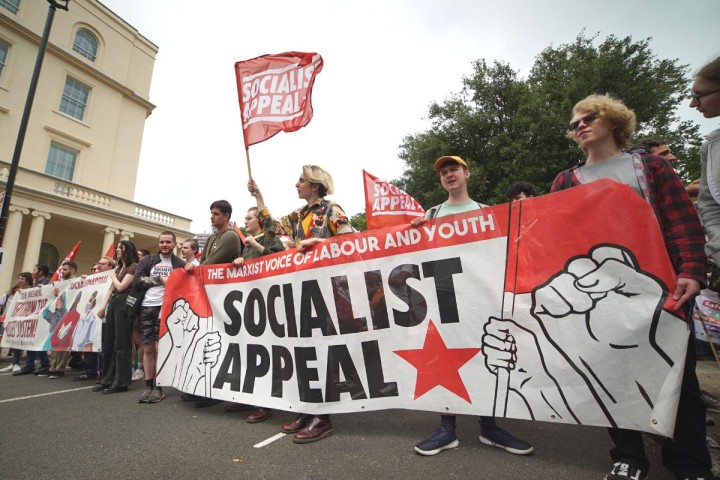 The crisis of world capitalism will open the way for the building of a mass Marxist tendency / Image: Socialist Appeal
The crisis of world capitalism will open the way for the building of a mass Marxist tendency / Image: Socialist Appeal
Every one of our readers and supporters must fully grasp the situation we have entered, and the tasks that flow from it. Every comrade must become recruitment conscious, and see their prime role as building the organisation on firm foundations. This task requires enthusiasm and audacity.
We have set our eyes on achieving 1,000 firm comrades by our next congress. This means recruiting the layers of radicalised workers and youth that come towards us. Under present conditions, everyone would agree that this is a very modest task.
In Britain, we have already made great advances on a national scale, rejuvenating and renovating the organisation from top to bottom. We must build upon this. With 1,000 cadres, theoretically and organisationally steeled, we would have the necessary framework to assimilate 10,000 new members in the period opening up.
Of course, the process unfolding in Britain will not be a straight line. There will be many ebbs and flows in the class struggle; defeats as well as advances. But for every step back, the working class, under the hammer blow of events, will take two steps forward.
The crisis of world capitalism, and especially of British capitalism, will open the most radical and revolutionary period in British history. The ideas of Marx, Engels, Lenin, and Trotsky will become the ideas looked towards by the advanced sections of the working class.
This will open the way for the building of a mass Marxist tendency; the building of the revolutionary party.
The International Marxist Tendency alone has the ideas and ability to turn this into a reality. We must rise to the challenges and tasks posed by history.
Originally published on 15 July at socialist.net

